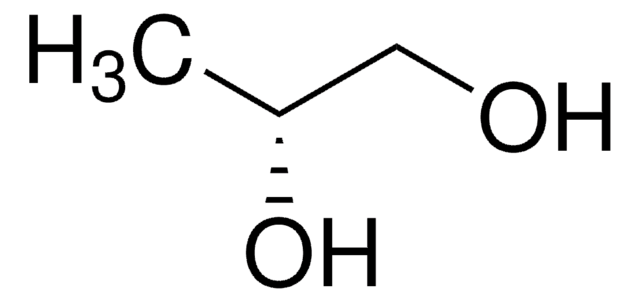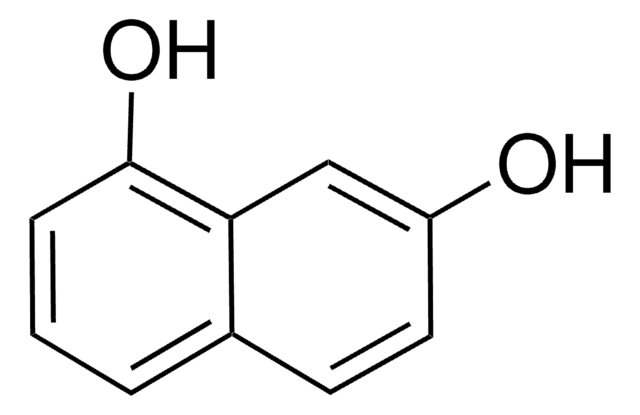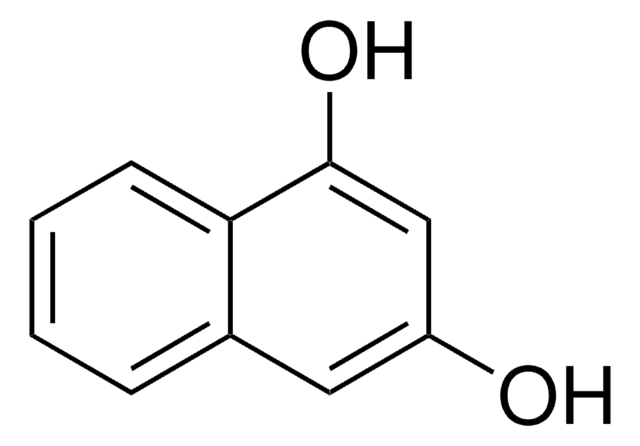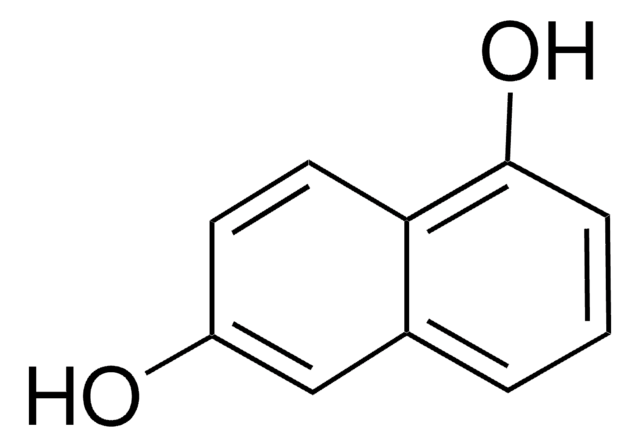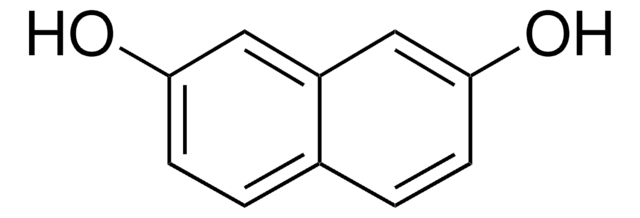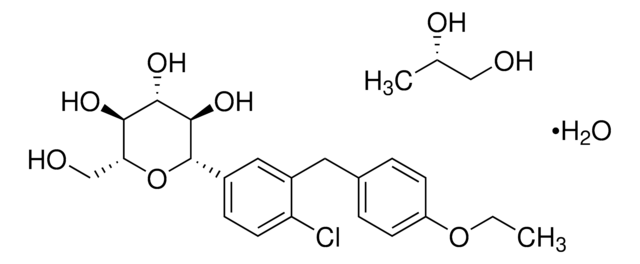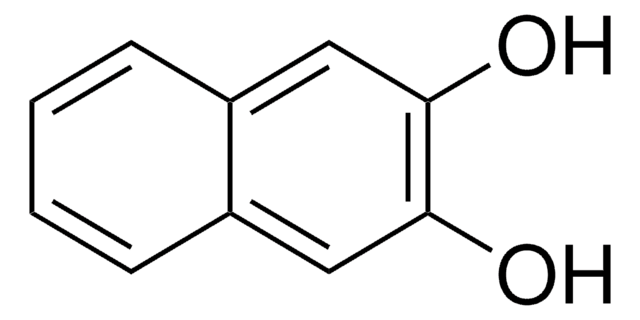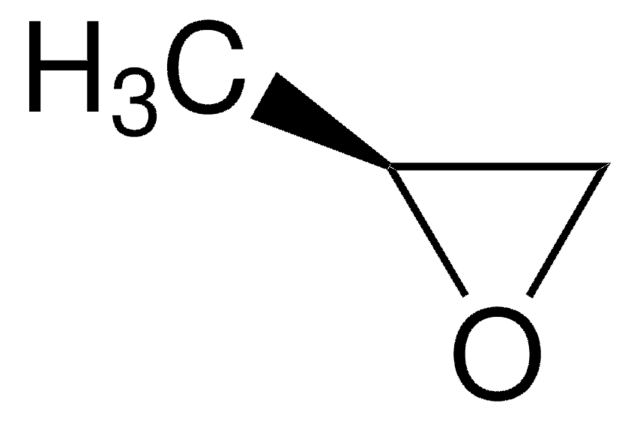Alle Fotos(1)
Wichtige Dokumente
540250
(S)-(+)-1,2-Propandiol
96%
Synonym(e):
(S)-(+)-Propylenglykol
Anmeldenzur Ansicht organisationsspezifischer und vertraglich vereinbarter Preise
Alle Fotos(1)
About This Item
Lineare Formel:
CH3CH(OH)CH2OH
CAS-Nummer:
Molekulargewicht:
76.09
Beilstein:
1718871
MDL-Nummer:
UNSPSC-Code:
12352001
PubChem Substanz-ID:
NACRES:
NA.22
Empfohlene Produkte
Qualitätsniveau
Assay
96%
Optische Aktivität
[α]20/D +16.5°, neat
Optische Reinheit
ee: 98% (GLC)
Brechungsindex
n20/D 1.432 (lit.)
bp
186-188 °C/765 mmHg (lit.)
Dichte
1.036 g/mL at 20 °C (lit.)
Funktionelle Gruppe
hydroxyl
SMILES String
C[C@H](O)CO
InChI
1S/C3H8O2/c1-3(5)2-4/h3-5H,2H2,1H3/t3-/m0/s1
InChIKey
DNIAPMSPPWPWGF-VKHMYHEASA-N
Suchen Sie nach ähnlichen Produkten? Aufrufen Leitfaden zum Produktvergleich
Verwandte Kategorien
Anwendung
(S)-(+)-1,2-Propanediol can be used as a reactant to synthesize:
- Optically active chiral (S)-1, 2-propanediol derivatives using mesogenic carboxylic acids via esterification in the presence of dimethylaminopyridine (DMAP) as a catalyst.
- 3,4-Ethylenedioxythiophenes via Mitsunobu reaction.
- Vicinal diol cyclic sulfates in the presence of sodium periodate and ruthenium chloride as catalysts.
Anwendung
Produkt-Nr.
Beschreibung
Preisangaben
Lagerklassenschlüssel
10 - Combustible liquids
WGK
WGK 3
Flammpunkt (°F)
217.4 °F - closed cup
Flammpunkt (°C)
103 °C - closed cup
Hier finden Sie alle aktuellen Versionen:
Besitzen Sie dieses Produkt bereits?
In der Dokumentenbibliothek finden Sie die Dokumentation zu den Produkten, die Sie kürzlich erworben haben.
Kunden haben sich ebenfalls angesehen
A A Melo et al.
The Journal of laryngology and otology, 127(4), 359-363 (2013-02-15)
To determine whether the administration of mitomycin C prevents propylene glycol exposure from inducing middle-ear cholesteatoma and otitis media, in a rat model. Twenty-four Wistar rats underwent intratympanic injections on days 1, 8 and 15, via the tympanic membrane pars
H Fromme et al.
Chemosphere, 90(11), 2714-2721 (2013-01-08)
Glycol ethers are a class of semi-volatile substances used as solvents in a variety of consumer products like cleaning agents, paints, cosmetics as well as chemical intermediates. We determined 11 metabolites of ethylene and propylene glycol ethers in 44 urine
Ying-Zheng Zhao et al.
Cancer letters, 330(1), 74-83 (2012-11-29)
Multidrug resistance (MDR) is one of the major reasons for the failure of cancer chemotherapy. A newly reported liposome carrier, propylene glycol liposomes (EPI-PG-liposomes) were made to load epirubicin (EPI) which enhanced EPI absorption in MDR tumor cells to overcome
Carla Caddeo et al.
International journal of pharmaceutics, 443(1-2), 128-136 (2013-01-10)
Diclofenac-loaded phospholipid vesicles, namely conventional liposomes, ethosomes and PEVs (penetration enhancer-containing vesicles) were developed and their efficacy in TPA (phorbol ester) induced skin inflammation was examined. Vesicles were made from a cheap and unpurified mixture of phospholipids and diclofenac sodium;
Kenneth B Sloan et al.
Journal of cosmetic science, 64(3), 181-192 (2013-06-12)
It would be useful to develop a surrogate for animal skin, which could be use to predict flux through human skin. The fluxes (and physicochemical properties) of sunscreens and other compounds from propylene glycol (PG):water (AQ), 30:70, through human skin
Chromatograms
suitable for GCUnser Team von Wissenschaftlern verfügt über Erfahrung in allen Forschungsbereichen einschließlich Life Science, Materialwissenschaften, chemischer Synthese, Chromatographie, Analytik und vielen mehr..
Setzen Sie sich mit dem technischen Dienst in Verbindung.